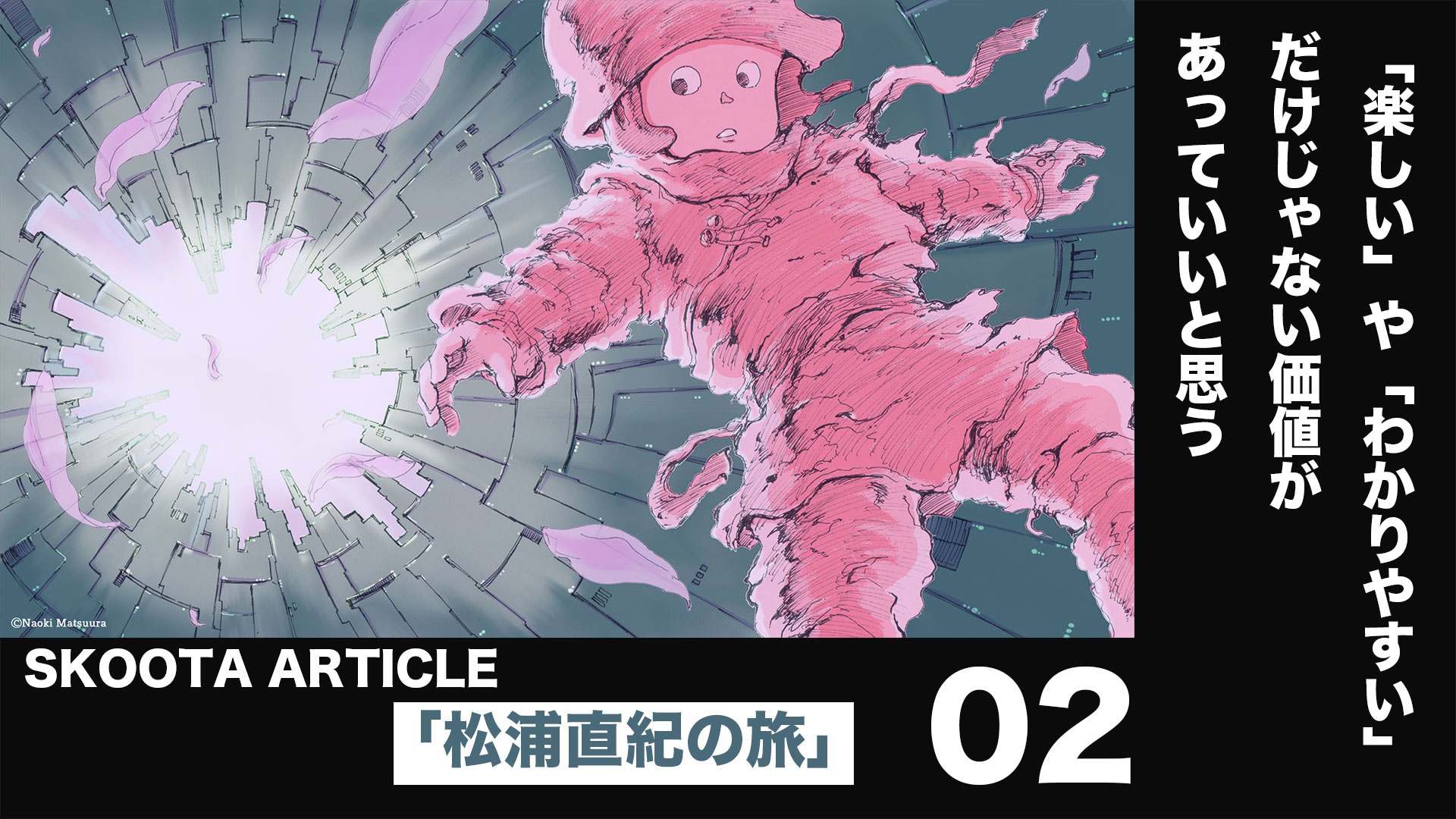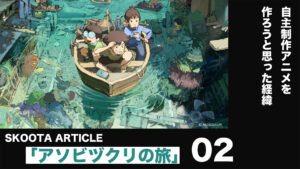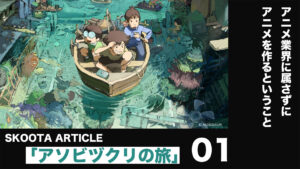
Guest, Personality
Guset:Naoki Matsuura
Currently active as an animation director, director, and animation creator
Member of the Japan Animation Association
Born in Tokyo in 1982, currently residing in Kanagawa Prefecture. Graduated from the Department of Imaging Arts and Sciences at Musashino Art University in 2006.
After working as a production assistant at Polygon Pictures, Production I.G, and ROBOT, among others, he became independent. He has experience in producing various types of visual and animated content, including TV, commercials, music videos, exhibitions, and live visuals. In 2016, he directed the exhibition video for the Japan Pavilion at the Milan Expo, and the project won a gold medal at the Expo. His first work as an animation director for a commercial project was the “Marukome Miso Animation CM.” Since then, he has also worked on storyboarding and directing TV series animations.
In 2016, he conducted crowdfunding for his original short film “Hizukuri,” raising over 1.7 million yen. The film was completed in 2021 and has been screened at events, distributed online, and submitted to film festivals, receiving nominations and awards both domestically and internationally.
In 2023, he directed the TV anime “Liar Liar.” Currently, he is directing a feature-length animated film scheduled for release in 2024.
Personality: Yuuki Sakoda
After working for a telecommunications company and a comprehensive advertising agency, he started an anime planning and production company and produces music videos and films. In 2021, he moved to Kyoto and started working on promoting the entertainment industry in Kyoto. He is currently also working in the entertainment field of manga and audio. He is planning and producing audio dramas and webtoons. In addition, he serves as a producer and advisor for multiple entertainment companies.
What bluntly told by director Satoshi Kon.
Sakoda
I think that even just talking about “Parasyte” or “AKIRA” could go on for hours, so while heading in that direction, let’s also talk about Matsura Works. I wanted to talk about something in Episode 1, but at this point, Matsura-san has graduated from university, worked in various positions at various companies, and is now working as an anime director, currently directing a movie set to be released in 2024. I think he has met various people in the process.
Among the story ideas I received, there are various encounters with people and words or phrases that Matsura-san heard from them. I’m curious about the meaning of these words and how Matsura-san interpreted them. There are many of them, and, well, it’s like… I don’t think it was said exactly word for word like this, but by the way, is it okay if I read this out loud?
Matsuura
It’s okay, no problem at all.
Sakoda
This memo is about words that were remembered by Mr. Matsuura. It was a discussion about “nothing from what Japanese anime has cultivated is being utilized” and “it would be great if you could learn to love the things you have to do,” which came up in a conversation with Mr. Satoshi Kon. Could you please provide some context or explain what the discussion was about?
Matsuura
First, what I was told directly, and the second, Kon Satoshi-san had a time when he was teaching at Musabi (Musashino Art University), and it was a word that Kon Satoshi-san had written on the website at that time.
Starting with the first one, the last thing I was doing at I.G as a production progress was a full 3D work called “Oblivion Island”. When that job was finished, I quit the company and was job hunting, wondering what to do next. Since I liked Kon Satoshi-san, I sent him an email from the homepage saying “Come and play”. At that time, Kon Satoshi-san had a seat at Madhouse and was in the middle of producing “Dreaming Machine”. So, I took the leaflet of “Oblivion Island” and said “Ah, I was doing this. If you like”, and that was the first line he said.
And what he said about that was, there was quite a black shadow in the CG model of the main character girl, and Kon Satoshi-san held that leaflet and said “Why is the character’s shadow black?”. He said, “Isn’t it that what Japanese anime has cultivated is not being utilized at all?” with a bitter smile.
Sakoda
Is it like the picture in the key visual?
Matsuura
That’s right. So, at that time, we worked hard with the CG people, but when they said that right off the bat, I was like “Ah, I was shocked”, but I thought “But that’s true, I see, I see”.
Sakoda
That’s something that really left an impression on me.
Matsuura
The moment I saw it, it was said to me in a quick snap, and I was surprised. If it were me, I think it would be like “Ah, I’ve been doing this, good job~, I’m going to see the theater”, but there is no such social formalities at all. (laughs) I quit I.G, and I was thinking about what to do and was wandering around job hunting, and so, I had a life consultation with Mr. Kon now. And after that, he said, “Let’s go for a drink”, and he took me to a nearby pub, and when we talked about various things, he said something like “You are interesting. Come again”.
Sakoda
Kon Satoshi started with manga and then moved on to anime, didn’t he? Somehow, it’s not so much that he was an anime kid from the start, but rather that he, like Matsuura-san, was a manga lover who enjoyed things like SF, and I guess there were parts where their wavelengths matched.
Matsuura
So when I heard the news of his death, I was really shocked. He gave me his mobile phone number when we went out for a meal, and I still have it, the phone number of Satoshi Kon. I can’t delete it. Well, I think of it as a memento. But the closest I got to talk to him was around that time.
And, well, from what I hear, he was a person who liked to talk to young people like that, and the guys around him who were doing anime often went out to play and were taught how to draw, I hear quite often. Satoshi Kon was a person who was very caring towards his juniors and was loved.
Sakoda
That’s right, isn’t it? I remember when I found out that “Dreaming Machine” was halfway through, and I was working in a completely different profession, I was wondering if a “Dreaming Machine” was something that couldn’t be achieved, and I contacted the producer. Now, after making films and several works, I understand that a work cannot be created without a core person.
I also talked to the producer at that time, and there was a conversation like “After all, this is a work that can’t be done without Mr. Kon now”, and I understand that now. It can’t be done the same way by anyone else, and whether it’s really good to imitate it the same way, or whether it’s required, or even if you’re chasing someone’s shadow, but that person isn’t there, you can’t take their place and do something. I really understand that now. Technically, it’s completely different, isn’t it? Even when you look at the storyboard, it’s amazing. I envy the history in Matsuura-san.
Matsuura
Really, it was just that time, but we talked closely and went to eat. It’s really just that we went to eat once.
Sakoda
When you say that, among the many encounters, it’s Mr. Aihara at the Hiroshima International Animation Festival.
Matsuura
Aihara-san as well~.
Sakoda
There’s an episode where someone told me “You can feel the music here,” and I think this ties back to what we were talking about earlier.
Matsuura
As I wrote in my note, when I was still a freshman in college, I went with some seniors from my club and showed them a photograph of a work I had made for a design assignment. At that time, I tied some clothes I wore everyday to a doll of about the same size as me, bundled up the clothes with a string, and basically created an object of my own life-size. I made it as if it were my avatar. I made the work with that concept and it was a photograph of that, but when Mr. Aihara saw it, he said, “Oh, I can feel the music,” which made me really happy.
And, I saw Mr. Aihara’s work at the film festival and thought, “Wow, this is amazing.” I felt like I was touching a profound world where such expression exists. The year I went, there were many foreign animations there, and I realized that such a world exists. Until then, I had only seen anime on TV or in movies, namely Japanese anime. But as I wrote, I really like Raul Servais.
Also, as I wrote in that note, I like “Walking” by Ryan Larkin. “This is amazing, what is this?” I was completely captivated. When I entered college, I was mainly exposed to what is called “art animation” in Europe. The term “art animation” is controversial. I didn’t use it very clearly this time. I try not to use it myself. I started to watch a lot of short foreign animation works. That’s when I started thinking about making my own work like this or that.
“I think it’s good to have value beyond just being ‘fun’ or ‘easy to understand’.”
Sakoda
As was also mentioned in the episode featuring Miku Mizue, first of all, after going to university and creating works there, through the act of participating in festivals or something, you first become aware of categories like abstract animation or experimental animation. I think there are places where you realize the breadth of animation, and the capacity of it. I think Japan has a unique environment for animation. Now, I dare to say animation, but symbolically, it’s “anime”. This thing called anime, Japan has it. And, this is my interpretation, but the content of Japanese anime is rich. In other words, understanding the meaning is a prerequisite, and the meaning must be conveyed. It’s becoming a medium that can be cut off if it doesn’t make sense.
Matsuura
I think when you start talking about it, it’s deeply rooted. It’s not always about things that are easy to understand, or just fun. For example, when I watched “AKIRA”, I was so shocked that I stopped eating pizza, saying, “What is this?” I felt sick, irritated, and was puzzled. I think it’s okay that these things happen. But as more and more people get involved, and more money is involved, it becomes public. To avoid getting angry, to avoid getting angry, well, since SNS has come out and the cancel culture is getting stronger, more and more people are paying attention to it.
When I was in university, there were a lot of crazy works, a lot of crazy works flowing at the school festival. There were so many of them that I couldn’t even say them here, let alone broadcast them on TV. There were also a lot of people who expressed themselves in abstract ways. But I think it’s important to face these incomprehensible things with your own body and time, and to feel and think about them properly.
Sakoda
I think so. One of the keywords that I thought would come up in this conversation is “physicality”. I believe it’s a keyword for Matsuura-san and I’ve been thinking a lot about physicality in recent years.
I don’t think this applies to everyone, but when using animation as a form of expression, what can be conveyed is almost close to physicality. The power to convey things that are strongly tied to physicality, such as the feeling of being disgusting or soft, is extraordinary. And then, the things that remain in memory for a long time are not so much the “meaning content” but the “expression” that is tied to the physicality.
The fluffy, the Cat Bus, is quite symbolic. I don’t think anyone really remembers the meaning conveyed by the animation Totoro. The actual signifier it wanted to convey wasn’t very strong, but the feeling of fluffiness and the refreshing feeling of the wind blowing through always remain in my memory. The feeling of eeriness in “Princess Mononoke” also remains in my memory. I think Matsuura-san also remembers the feeling of eeriness in “AKIRA” more than the story of “AKIRA”. So what remains is not the focus of the story, but I think the expression is what remains. And I think it’s better if that expression is tied to physicality.
Matsuura
When talking about “AKIRA”, isn’t it just about fighting? Childhood friends have become biker gangs and are just fighting, aren’t they?
Sakoda
In terms of the content, it’s like, “What’s the story?” It’s a story about a fight with a childhood friend.
Matsuura
Various societies, the military, nations, and so on get involved, and the scale of the conflict only grows larger. It’s not just about depicting that in overwhelming detail and resolution, is it? So, I don’t think Mr. Otomo is likely to be thinking about conveying something noble in terms of the story. It’s just about relentlessly pursuing the current situation in overwhelming detail. As someone who loves superhero stuff like Doraemon, Kamen Rider, and is deeply involved in it, it’s not about justice defeating evil that aims to conquer the world, it’s not a world of promoting virtue and punishing vice, I was drawn into a more gritty world and sensation.
So, I really like Sentai and Kamen Rider too, I’m not following the main story, but I’m just looking at the design. Every year, I look at the settings and situations, and of course, Marvel too, but it’s become a time when it’s hard to depict villains. World domination or something like destroying humanity is no longer evil. In other words, groups that advocate such motives can’t be depicted as villains, can they?
To give a recent example, when was it, I liked Marvel’s “Doctor Strange”, and I watched the sequel, Multiverse, but I haven’t watched the drama, but basically, Scarlett becomes a semi-villain, and that also ends up destroying the world, but the motive of the villainous Scarlett is just wanting to be with her family, wanting to spend time with her children, isn’t it? It’s ironic that it becomes evil. I watched that and thought, “Even Marvel can’t treat destroying the world or destroying humanity as evil anymore.” I felt it deeply.
Sakoda
Well, it’s hard for Disney to depict that now, isn’t it? After all, there’s diversity, and everyone has their own sense of justice, and because there are various perspectives from other points of view, there’s this thing that says, “This person has come to this decision because of this,” and we have to depict that. I really think that this is a trend in entertainment right now.
But there are also good ways to depict it, and in Japanese anime, for instance, Gundam has been doing that all along, hasn’t it? Each person has their own circumstances, and from a certain perspective, it may have been a tragic outcome or a ruthless decision, but from another perspective, it was that person’s true justice and a very determined decision. That’s the direction the world is heading in now. So it feels like Gundam is back again.
Matsuura
I see.
Sakoda
Amidst all this, I would like to introduce a song here. Is there any song you would recommend listening to?
Matsuura
I’d like to introduce Bob Dylan’s “Forever Young,” going back a little in time.
“The Congress Future Congress” was a movie that demanded viewers to think.
Sakoda
Yes. You just listened to Bob Dylan’s “Forever Young”, but what is the background of this song?
Matsuura
It’s not at all real-time, but there’s a slightly strange movie called “Congress Future Conference,” and I really love it.
Sakoda
I haven’t watched it, but it seemed interesting just by looking at the overview.
Matsuura
Wow, it’s crazy. When was it, around 2015 or 2016, I guess? It may be related to the story of justice and evil I just mentioned. It was like a shock as if I was hit on the head with a hammer. They use animation to criticize animation, it’s new, isn’t it? I really want you to watch the main story. The theme song or the one that plays at the end, I don’t know much about it, but the main actor was singing it, I’m sorry if I’m wrong. It’s reflected by a female vocal and plays, and when I know it’s a Bob Dylan song and research the lyrics and background, it was a song that really made sense why they played it at the end.
Sakoda
Well, it’s like the “Congress Future Conference”, but there were many things that I haven’t seen in the notes I got from Matsuura-san, so I’ve watched what I can watch, but there are still things I can’t watch, so I thought I would like to talk about various things when I see them.
Matsuura
The “Congress Future Conference” is amazing, isn’t it? Well, I probably could still talk for hours. (laughs)
Sakoda
Returning to our previous conversation momentarily, I haven’t seen the “Congress Future Conference,” so this is purely a wild guess. You know how these types of works usually have a message they want to convey. I guess they’re entertaining in their form of expression, but the content and meaning are probably strong. When I thought it might be dealing with quite real stories metaphorically, it’s easy to talk about things that really stand out in terms of content and meaning.
It’s easy to discuss, there’s a lot worth considering, and it’s easy to become a topic of conversation with various people. And there’s a slight trend where something being easy to talk about affects the quality of the content. Things that really resonated with you but are hard to put into words or inscrutable end the conversation quickly, ending with “that was nice”.
I feel like this suits social media culture in some ways, but doesn’t in others. It won’t become controversial because it can’t be put into words. But things like “this is good, isn’t it?” and “I like it” are easy to circulate and don’t lead to disputes. When I’m creating something, my thoughts often go more to what I want to convey rather than how to convey it, because strengthening the content and meaning is quite straightforward. But how to convey it is very important. Whether to convey the same message by singing, speaking, storytelling, etc. There are various ways.
Matsuura
Regarding the movie “The Congress” itself, what I felt was that it was definitely a movie that demands the viewer to think. It feels like it’s asking, “So, what would you do?” And from there, I was constantly thinking, “What should I do?”
Sakoda
I received that message and I’m still thinking about it now.
Matsuura
I think it’s that kind of work, but on the other hand, depending on the viewpoint, such themes or criticisms are also very readable. But stripping all of that away, there’s an aftertaste like you’re being asked, “What will you do in the end?” And I think that was close to “Parasite”. After finishing reading the original “Parasite”, it’s like, “Ah, it’s over. But what should I do?” Well, it’s definitely not a “Nice story, the end! Happy ending”, but broadly speaking, it could be seen from the perspective of “What will humanity do from now on?”, or it could be a story about love for family, issues of science and technology, issues of social systems, and so on. So, it has a lot of implications. It’s a strange movie, really.
Sakoda
You were saying you got hooked on “Five Star Stories”, weren’t you? I guess what’s common is that Matsura-san likes this multi-layered and faceted story.
Matsuura
That’s right. Five Star Stories is amazing, isn’t it? It’s still somewhat of a myth. Well, the ending is predetermined by the timeline. And Mr. Nagano has been depicting that history of thousands of years, and it’s still ongoing, and I don’t know when it will end.
Sakoda
It’s truly a myth, right? Somehow tracing the entire history of human existence, and telling a story at the same time. Isn’t that what myths are? Because if people’s actions are simply conveyed as they are, no one would carry them on, so I think it’s about conveying them in an interesting and amusing way. Various things are narrated and taken up, such as things that are difficult to say or things that can’t be conveyed.
Going back to the story a bit, Mr. Matsuura, while currently handling client work and producing independent works, uses this animated visual expression, including various music. With the various information it carries, there is a message I want to convey, and I think there are various ways to convey it. I think it’s about selecting the media closest to my own senses.
Episode with Director Mamoru Oshii I Experienced During My Fresh Out of College Days
Sakoda
Returning to Matsuura-san’s series of encounters with various people in various companies and projects, we have an episode with Director Mamoru Oshii during “The Sky Crawlers”. This is interesting, to say in the words given by Matsuura-san, there’s a remark from Oshii-san saying, “I haven’t started Photoshop for many years”, but I don’t understand the context of this sentence, this dialogue, just from this alone.
Matsuura
Something like when I was waiting for a taxi with the producer on the way back from a meeting, we were talking about something like Photoshop, and then, Mr. Oshii said with a bitter smile. At that time, I was still a year or two out of college.
Sakoda
Oh, is it that time?
Matsuura
I was quite surprised. I thought, “Oh, film directors don’t need to use Photoshop.” That directors can do their job without using Photoshop. So, basically, I got into university, became a slave to Adobe, learned how to use Photoshop and After Effects vigorously, colored and animated things myself, saying “Look at this!”, and that’s how I “did the directing”. But that’s not how Mr. Oshii does it.
Well, originally, he’s not an illustrator, so maybe that’s his stance. To me, who has a sort of reverence for Mr. Miyazaki, the main point was that “not drawing pictures” or image processing, or drawing pictures is not the only thing a director does. It was a profound realization for me. Mr. Oshii didn’t intend to teach me anything, but in casual conversation, he just casually said, “No, I haven’t used Photoshop in years.” But for me at the time, as I just mentioned, it was quite a surprise to hear, “Oh, directors can work without using Photoshop.”
Sakoda
But those are words that quite moved Mr. Matsuura, right? This is because, even if we continue to revere Mr. Hayao Miyazaki, if we can’t draw that much, we can’t do the director, I think.
Matsuura
That’s right. So, even though I graduated from an art college, my painting has always been self-taught, and when it comes to making images, I do have tests where I draw something like image illustrations, but it’s not a department where I’m required to do design or what you might call oil painting or Japanese painting. So, I can kind of draw, but I’m not as skilled as those who are really into it.
And, well, when I thought I wanted to do anime, and when I thought about where the anime companies are, I decided to become a production progress and an animator. And, well, this can be a harsh reality, but as an animator, you have to work on a unit price basis, so you think, “Ah, I can’t make a living on my salary alone,” and you decide to enter from the production progress part. It was kind of a process of elimination.
Sakoda
So, is it your sense that having made such a choice and being able to see the production progress and the production side, it has become a foothold for Mr. Matsuura’s unique position now?
Matsuura
Well, I’m glad I was working on the production. (laughs)
Sakoda
I feel like many people want to hear that story. I often think that when I hear students’ stories, everyone must be really good at drawing, but within the desire to somehow make animations, there are quite a few people who aren’t great at drawing but want to enter the animation industry, so they adopt the mindset of a production manager. That’s what you’ve been doing as a senior, and now as a director, Mr. Matsuura, so I felt like many people would want to hear Mr. Matsuura’s opinion.
Matsuura
Well, in the end, isn’t it fine as long as you’re happy with yourself? That’s where I usually settle. In my case, I like to chat with people because of my personality, and if I go back a bit, I was into theater in high school, so I liked to be in front of people and make a fuss, and talk to people, so I had no resistance at all.
However, if someone is not good at it in the first place, I think it’s better to excel as a painter, and if you’re like me, who likes to talk to people, adjust to people’s schedules, or have meetings and manage them, why not try it now? But after all, the barrier to entry is low, isn’t it? You need a driver’s license, but there are no qualifications or licenses.
Sakoda
Well, I feel like there are quite a few places where you might not need a car license nowadays.
Matsuura
I see, I see, that’s how it is now, isn’t it? When I was working on production, I used to say, “I want to be a director,” but I was agonizing over how to become one. The producer who really helped me the most was about to leave IG, and we went to eat together. We had a conversation then, about a director of TV series, well, I’ll withhold the name, but anyway, there was this person who didn’t work. They would keep dawdling, not delivering when they said they would, and would often go home saying they were not feeling well. There was a veteran who was doing storyboards and direction.
So, when this producer was about to leave, we went to eat together and he said, “You know, when Mr. A, let’s call him Mr. A for now, didn’t deliver the storyboard, you should have drawn it and shown it to the director.” “Whether it’s used or not, I think it would have been good if you had done it that way at that time,” he said, and it was quite a shock, like a bolt from the blue. “Ah, I see, I should have done that,” I thought. Basically, I should have taken the work from that person, I thought, “If the person who’s supposed to draw the storyboard doesn’t deliver it, then I’ll draw it,” and shown it to the director, saying “I tried drawing this, what do you think?”
“Ah, I see,” I thought. That kind of thing is totally acceptable, isn’t it? In terms of the industry as well. It’s about not refusing anyone who comes. “Ah, I see,” I thought. So I think, unless you’re really aggressive, opportunities won’t come. That’s a story I still remember very well. The producer and I still keep in touch occasionally by email, and he supported me during the crowdfunding campaign, and he’s still working at IG, but I’d like to go out for a meal again, I wonder how he’s doing.
Sakoda
From the words spoken by Mr. Oshii, I redefined the image of a director in myself, and through conversations with various producers, during the production process, rather than perfecting that, I wanted to do it as a director. I think it was a four-year period in which such feelings grew rapidly in Mr. Matsura. When the thought “I want to be a director” overflowed, was it that you talked with Mr. Ishikawa?
Matsuura
Once a year, there’s something called a “President’s Interview,” and at that time, I was told straight out, “You’re not cut out for production.” And I was like, “Well, yeah, haha.” And I said, “I want to be a director, I want to be…” From President Ishikawa, I was told something like, “If you want to be a director, go out and work hard.”
First and foremost, I still love IG and deeply respect President Ishikawa and those who are now taking care of me. But in essence, I was a full-time employee as a production progressor, and I was told that if I stayed, my salary would be reduced. And if I were to quit a year later, my salary would be increased. And when asked what I would do, I said, “Well, I’ll quit,” and I did quit a year later. Well, the company was also in a bit of a precarious situation at the time, so I was pushed to quit, but I had the option and I answered on the spot. I thought it was better not to stay for long.
After all, I was only able to help with one production later on, but I was called in to direct. President Ishikawa is an interesting person. Oh, but I was told by someone that I resemble Ishikawa. That’s presumptuous of me, but I’m a bit off the rails but I’m not wavering.
“It’s not a bad idea to save what you want to do for later.”
Matsuura
One more thing I wanted to discuss was a conversation with Mr. Atsushi Takeuchi, as Mr. Oshii put it. Mr. Atsushi Takeuchi, who is also a director, is extremely skilled at mechanical design. During the production of “Sky Crawlers,” I was essentially in charge of Mr. Takeuchi’s production. Mr. Takeuchi was responsible for the layout of several cuts featuring mecha, and well, he didn’t quite get it done. He’s a bit slow with the pen. During a time when the schedule couldn’t be extended any further, there was a meeting with the producer at the time, Mr. Oshii, myself, and Mr. Takeuchi. There was quite a serious discussion, and at that time, Mr. Oshii said to Mr. Takeuchi, “You can’t do everything you want to do in one work, so save some of it for next time.”
And then, with a wry smile at the end, he said, “No, Take-chan, I’ve heard you’ve grown up recently, but from my perspective, you’re still a child.” He said, “You can’t do everything you want to do in one go, so save it for next time,” and that’s how he encouraged the other party. Mr. Takeuchi was silent, but the layout was all up the following week.
I thought, “That’s amazing,” when I heard that. It’s not like he’s giving in or pushing down from above, it’s more like he’s walking alongside, patting his shoulder at the same level, and I remember Mr. Oshii’s way of speaking at that time very well. And while saying that you’re still a child, he talked a little about the future, saying that the things you want to do should be left for next time, and I think that’s when Mr. Takeuchi was ignited.
I don’t know how Mr. Takeuchi felt at that time, but he might have thought, “Damn it, this guy.” But I think the fact that he was able to deliver a good performance means he was emotionally invested. It’s often said that Mr. Oshii is a great people person, involving his staff in discussions and encouraging them. And indeed, all the main staff love Mr. Oshii. Whenever I talk to anyone from any section, they’re like, “If I don’t do it, Mr. Oshii won’t…” or, “Oh, Mr. Oshii can’t be helped,” or, “I’ll do it for him.” Everyone gathers with that kind of feeling. Everyone looks so happy. It was tough at times, but with the feeling of, “It can’t be helped,” or, “I’ll do it,” the staff gathered. Seeing that, I thought, “Ah, this is what’s important.” There are places where you’re attracted by the dazzlingly super skills of an animator like Mr. Miyazaki, but having worked with Mr. Oshii, watching his interactions and the way he talks with those around him, I learned that this is what’s really important.
Sakoda
Perhaps an ideal image of Director Matsuura was formed during the time I spent with Mr. Oshii.
Matsuura
Yes, as I talk, I remember, and I originally liked the work and joined it, and after all, I learned a lot by watching the usual casual way of talking and working.
Sakoda
I think it was a page of a certain history because I was there at the scene, but I’m really glad that I could record it like this.
Matsuura
Well, Mr. Takeuchi might get angry if he hears this, haha.
Sakoda
I may not be able to casually say that I understand Mr. Takeuchi’s feelings, but I definitely think that if you are going to do something, you want to put everything into it, and I think that’s what makes a good creator. I haven’t followed Mr. Oshii, who I only know about from the media, very closely, so I don’t know much about him, but listening to the current conversation, he seems to be a very coordinating type of director.
Matsuura
No, it’s really true. If you only look at the way they talk when they appear in the media, they might seem very serious, muttering difficult things, and always looking grumpy. But it’s totally the opposite. They are very charming, laugh a lot, talk a lot, and really, they don’t act arrogant at all.
Sakoda
I heard that Mr. Yui also had times when he couldn’t make works, but he probably understood sensually that “there are works due to connections with people” in such situations. I guess it’s like being surrounded on all sides, or being arrogant. Suddenly there were hardly any chances for the next work. After all, it’s between people, yeah.
I think Mr. Matsuura also had various experiences during the IG era and there, and I think there were various gaps, but about this work called “Fire Making”, he was talking about crowdfunding earlier, but he used crowdfunding as a trigger to start working on the work called “Fire Making” and he has been working on it until now. I hope we can hear that story in Episode 3 next time.
#03に続く





